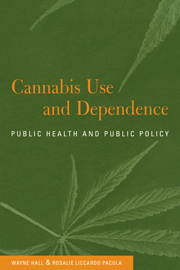Book contents
- Frontmatter
- Dedication
- Contents
- List of figures and tables
- Foreword
- Acknowledgements
- 1 Introduction
- Section 1 Cannabis the drug and how it is used
- Section 2 The health effects of cannabis
- Section 3 The psychological effects of chronic cannabis use
- Section 4 Effects on adolescent development
- Section 5 Harms and benefits of cannabis use
- Section 6 The effectiveness and costs of cannabis prohibition
- Section 7 Policy alternatives
- 17 Variations on prohibition
- 18 Cannabis as a legal substance
- 19 Summing up
- Appendix 1
- Appendix 2
- References
- Index
19 - Summing up
from Section 7 - Policy alternatives
Published online by Cambridge University Press: 05 July 2016
- Frontmatter
- Dedication
- Contents
- List of figures and tables
- Foreword
- Acknowledgements
- 1 Introduction
- Section 1 Cannabis the drug and how it is used
- Section 2 The health effects of cannabis
- Section 3 The psychological effects of chronic cannabis use
- Section 4 Effects on adolescent development
- Section 5 Harms and benefits of cannabis use
- Section 6 The effectiveness and costs of cannabis prohibition
- Section 7 Policy alternatives
- 17 Variations on prohibition
- 18 Cannabis as a legal substance
- 19 Summing up
- Appendix 1
- Appendix 2
- References
- Index
Summary
In many developed countries the debate about cannabis policy has been simplified in the popular media to a choice of two options: (1) we should legalise cannabis, or at the very least decriminalise its use, because its use is harmless (or at least much less harmful than alcohol); or (2) we should continue to prohibit cannabis use because it is harmful to users. We have argued that this simplification has distorted the policy debate and evaluations of the health risks of cannabis use.
Our aim has been to broaden the cannabis policy debate to take account of the problems caused by our efforts to control cannabis use. The fact that we have devoted much more space to the adverse health effects of cannabis than we have to the effectiveness and costs of cannabis prohibition reflects the power of the policy simplification to direct research investment. We support recent proposals for more research on the effectiveness of drug policy (Manski et al., 2001) which may address the current imbalance in research investment.
The health and psychological effects of cannabis use
Acute psychological and health effects
The main reason why people use cannabis is to feel good, relax, and be sociable. These effects come at the cost of impaired attention, short-term memory, and psychomotor performance. The most frequent unpleasant effects of cannabis use are anxiety and panic reactions. These most often occur in users who are unfamiliar with the drug's effects. Psychotic symptoms such as delusions and hallucinations may be experienced following very high doses. There are no cases of fatal cannabis poisoning in the human medical literature and the fatal dose in humans is likely to exceed what recreational users can ingest.
Psychomotor effects and driving
Cannabis intoxication impairs a wide range of cognitive and behavioural functions that are involved in driving an automobile or operating machinery. It has been difficult until recently to decide whether these impairments increase the risk of being involved in motor vehicle accidents. Studies of the effect of cannabis on driving performance on the road have found only modest impairments because cannabis-intoxicated drivers drive more slowly, and take fewer risks, than alcoholintoxicated drinkers. More recent evidence from large, well-controlled longitudinal and case-control studies suggests that driving after using cannabis on its own approximately doubles the risk of accidental injury in a motor vehicle accident.
Information
- Type
- Chapter
- Information
- Cannabis Use and DependencePublic Health and Public Policy, pp. 213 - 226Publisher: Cambridge University PressPrint publication year: 2002
